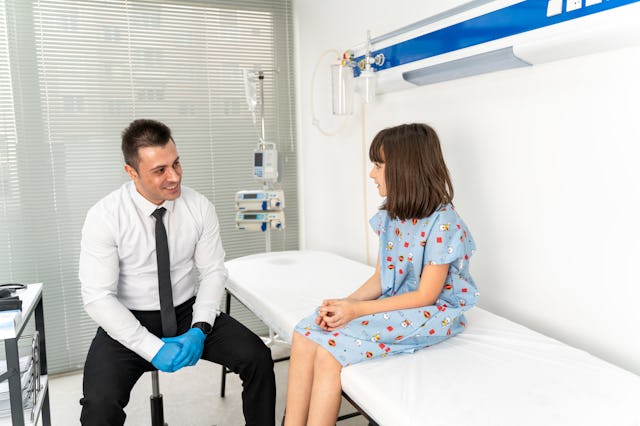Study: Kids Visiting The ER in Mental Crisis Often Get Zero Follow-Up Care
The new study also found these same kids often wind up right back in the ER.

Now, more than ever, parents are keeping a close eye on their kids’ mental health. Reeling from the pandemic, parents are seeing anxiety, fear, and depression in their children at alarming rates.
While we can keep our kids safe from cuts and bruises as they play at the park, their precious, fragile brains are an entirely different beast. According to recent research, more kids are heading to the ER for mental health crisis than ever before.
Before the COVID-19 pandemic, the US Centers for Disease Control and Prevention found that 1 in 5 children had a mental health disorder, but only about 20% of those kids got care from a mental health provider.
Now, a new study has found that almost 50% of kids who do receive initial care are not getting the proper follow-up treatment.
Published in the newest issue of the journal Pediatrics, Dr. Jennifer Hoffmann and her co-authors noted in their study that 28,000 U.S. kids were discharged from the ER for a mental health concern, and only about half had a follow-up health care appointment within a month.
More than one-fourth of kids were back in the ER within six months of their first visit.
These stats are not a surprise to researchers, who noted that this is just concrete data to back up what they’ve been witnessing first hand.
“We know what a child needs, but we’re just not able to schedule follow-up due to shortages among the mental health profession. They’re widespread across the US,” she said.
She also said that this fact is “devastating” for parents and emergency department staff alike who see kids come to the hospital for a various amount of mental health concerns. Some are suicidal or self harming while others suffer from panic attacks or serious behavioral issues. Sometimes parents have nowhere else to go when in crisis.
“The emergency department is a safety net. It’s always open, but there’s limited extent to the types of mental health services we can provide in that setting,” Hoffmann said. “This really speaks to inadequate access to services that these kids need.”
Researchers also found that Black children are especially underserved when it comes to mental health services. Forty-nine percent of Black children had a follow-up visit within a month of their ER visit compared to 59% of white kids, “which is very concerning, given that there are many disparities in access to care in our mental health system,” Hoffmann said.
While Hoffmann could not pinpoint exactly why this is the case, Black children are more likely to live in neighborhoods that have shortages of mental health professionals.
The mental health field also has a diversity problem. Studies show that a little over 83% of psychologists are white, as are nearly 65% of counselors and more than 60% of social workers. And Black children more often rely on school-based mental health services, studies show, which leads to another problem.
According to the National Association of School Psychologists, the national ratio for school psychologist to student in the 2021-22 school year was 1,127 to 1. The organization recommends a ratio of one school psychologist to 500 students.
President Joe Biden’s administration has plans to make it easier for children to get access to mental health services by allowing schools to use Medicaid dollars to hire additional school counselors and social workers. But Hoffman and her colleagues are not sure that’s enough. She hopes her study will prompt policy-makers to invest more so it doesn’t matter where a child lives — they can still get adequate mental health treatment.
The amount of kids heading to the emergency department for mental health services is also a glaring response to the lack of mental health care in schools and local communities.
“EDs are the last stop when all else has failed, and they, too, lack the resources to support, or even discharge, these patients,” the commentary on the study says. “This new analysis adds to the overwhelming evidence that there is an urgent need for a dramatic change in our pediatric mental health care system.”
“We believe it is time for a ‘child mental health moonshot,’ and call on the field and its funders to come together to launch the next wave of bold mental health research, for the benefit of these children and their families who so desperately need our support.”
In short, it sounds like the lack of mental health services is causing both more trips to the ER for kids and a lack of follow-up care for those same kids. This needs to be fixed now.
Read the entire study here.
This article was originally published on